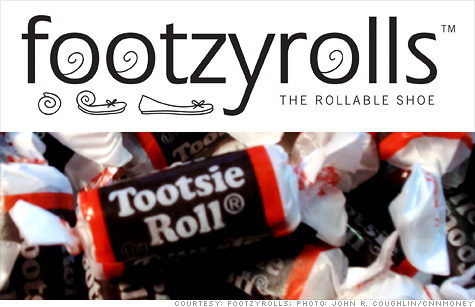
Candy conglomerate Tootsie Roll recently hit Footzyrolls, a shoe startup, with a trademark infringement lawsuit.
NEW YORK (CNNMoney) -- A trademark can be a company's greatest asset. It can also be one of its biggest challenges -- especially lately.
Some 3,652 trademark cases were filed in U.S. courts in 2010, up 8% over the previous year, according to FTI Consulting's latest figures. That's the biggest percentage increase in the last 10 years.
Industry experts expect that trend to continue this year as established companies --fueled by the languishing economy -- become more aggressive about protecting their intellectual property.
For small business, it's critical to know how to register a trademark, protect it and avoid infringing on established ones. Trademark lawsuits can be time-consuming and costly -- amounting in hundred of thousands of dollars in legal fees. And for some the outcome can be worse.
Just last week candy conglomerate Tootsie Roll Industries (TR) filed a trademark infringement lawsuit against shoe startup Rollashoe's "Footzyrolls" brand. Rollashoe is prepared to protect its brand. But the litigation, said its lawyer John Driscoll, "could kill [the Footzyrolls] business."
A trademark is a name, logo, tagline, colors that identify a product or service. Some famous examples: McDonald's golden arches, the color brown for UPS' shipping service, Nike's "swoosh" logo.
Owners of registered trademarks can take legal action against anybody who uses or attempts to profit -- even in subtle ways -- from their trademarks without permission.
The surge in trademark battles, which can occur at the United States Patent and Trademark Office or in a court of law -- is not surprising, according to experts. The value of a trademark, depending on the company, can be worth millions of dollars.
Furthermore, more law firms have found trademark litigation to be a lucrative business, said Matthew Swyers, founder of The Trademark Company, which represents thousands of small businesses. Law firms are hurting, he said. "They need billable hours."
So what can small business owners do to avoid a trademark scuffle or at least minimize the damage if they find themselves mired in one? Plenty.
Do some legwork: First search Google (GOOG, Fortune 500) to see if your intended trademark already exists, suggested David Byer, intellectual property attorney with K&L Gates.
Swyers added that a small business owner should pay for a trademark research report that includes information from federal and state trademark databases. "This casts a wide net and will bring in anything that could become a problem," he said.
Beware of "parodying" a famous brand. Trademark parody means having a trademark that plays off of an already famous one. And big companies have protection against that. Swyers said most large iconic brands, such as Coca-Cola (KO, Fortune 500), McDonald's (MCD, Fortune 500), Pepsi (PEP, Fortune 500) are protected by a law called the Trademark Dilution Revision Act.
This law protects trademarks of famous brands from being violated even if the new trademark is being used for a non-competing product or service.
"Everyone knows Ford is a automaker. So if some company starts using "phord" for a candy, Ford can make the case that it is still trademark infringement of its Ford trademark and can use a parody defense," said Swyers.
Hire a lawyer. "An experienced trademark lawyer can assess your trademark before you file and tell you if it is slightly risky, highly risky or in clear violation of an existing trademark," said Byer.
Byer said many law firms offer a fixed fee package for these services. "Every small business can and should afford this service," he said. "The cost savings in the long run can be tremendous."
File for trademark protection. Both Swyers and Byer recommend entrepreneurs file a federal trademark registration with the USPTO, which will protect their trademark nationwide. It costs between $275 and $375.
"Your trademark immediately appears on the federal register," explained Swyers. "Anyone who searches for that same name or logo will see that you have already claimed the right to that trademark."
Byer also advises his clients to register a European "Community Trademark," which safeguards a trademark in 27 European countries. It is also good to register in Canada, China and Japan, as well.
This way, a small business isn't vulnerable to trademark infringement overseas, he said.
Police your trademark. Once a business has its trademark registered, which can take up to eight months, Swyers said the company must rigorously defend it.
"With a large brand like Coca-Cola, trademark infringement is more about protecting the goodwill they've established with consumers over the years and not so much about losing marketshare," said Swyers.
The downside is that protecting a trademark can hurt revenues. "I had one small business client whose trademark was blatantly infringed," he said. Sales fell 50% month over month."
Know when to walk away. Sometimes a startup does everything by the book and still faces a trademark fight.
"In those situations I tell my clients to think about the legal expenses as a necessary business expense," said Swyers. "But if those fees start exceeding your returns, maybe it's better to settle and change the trademark and still keep the business."
Are you a small business that is currently involved in a trademark scuffle? E-mail Parija Kavilanz and you could be part of an upcoming article. Click here for CNNMoney.com comment policy. ![]()